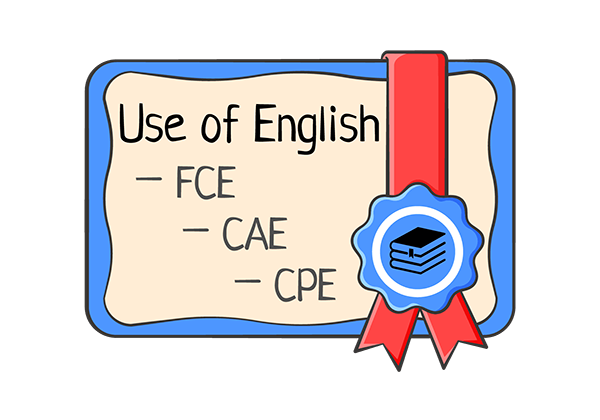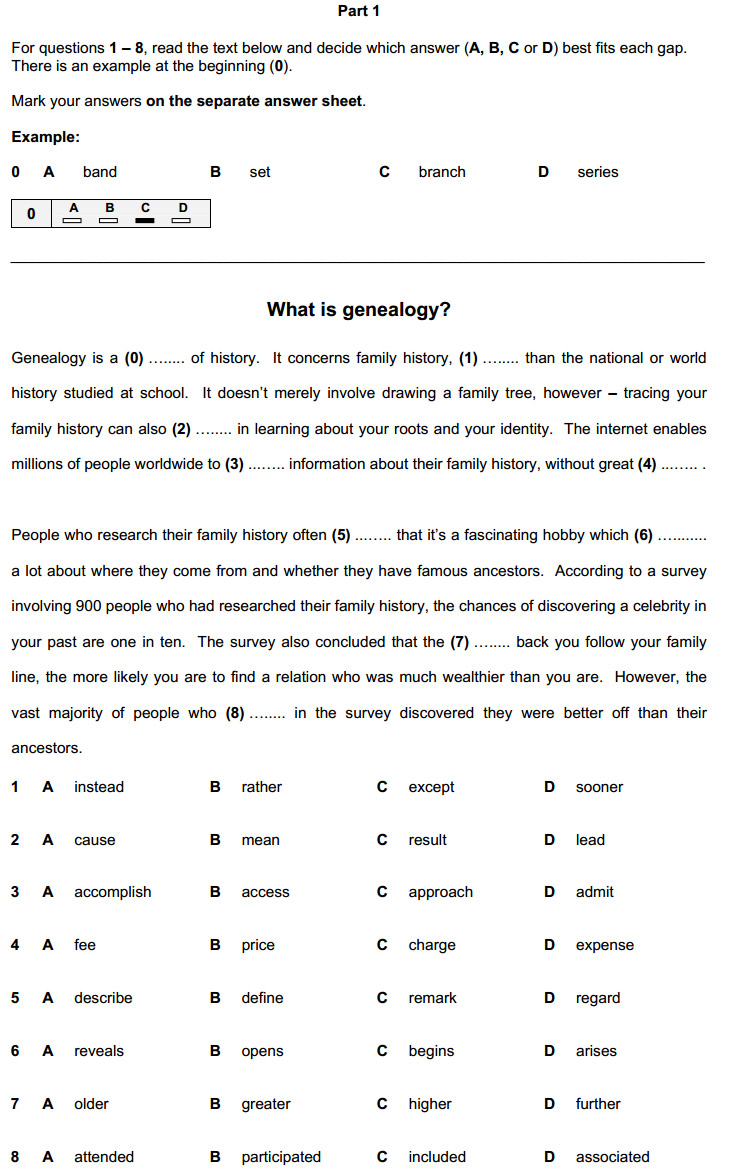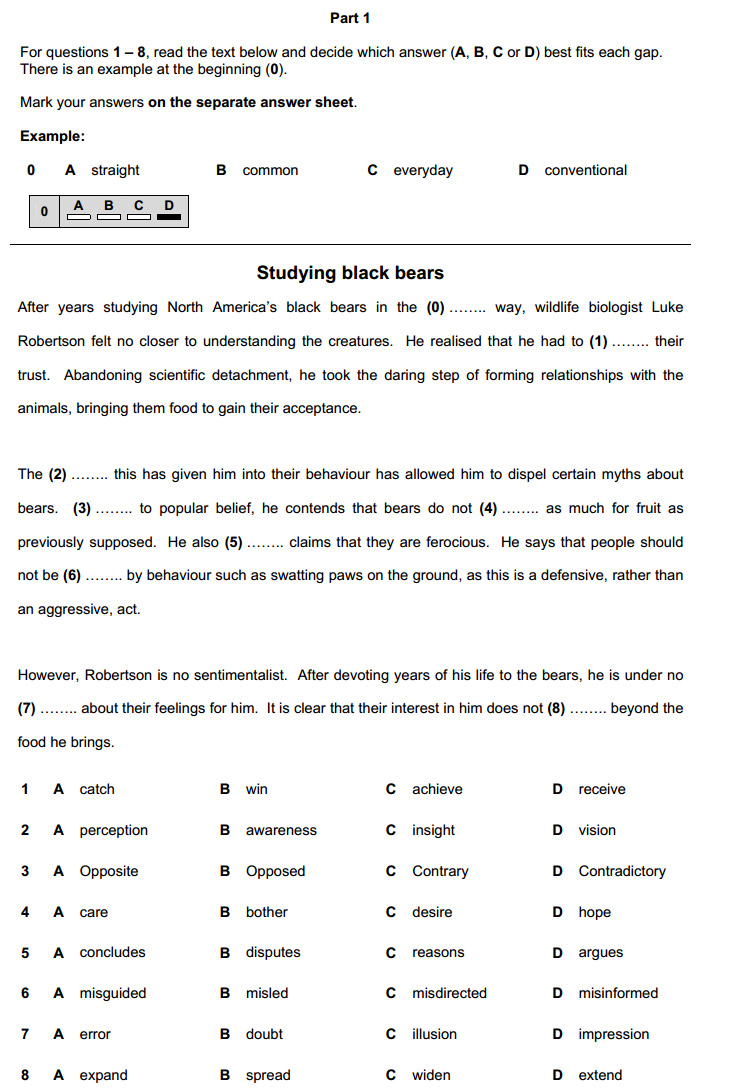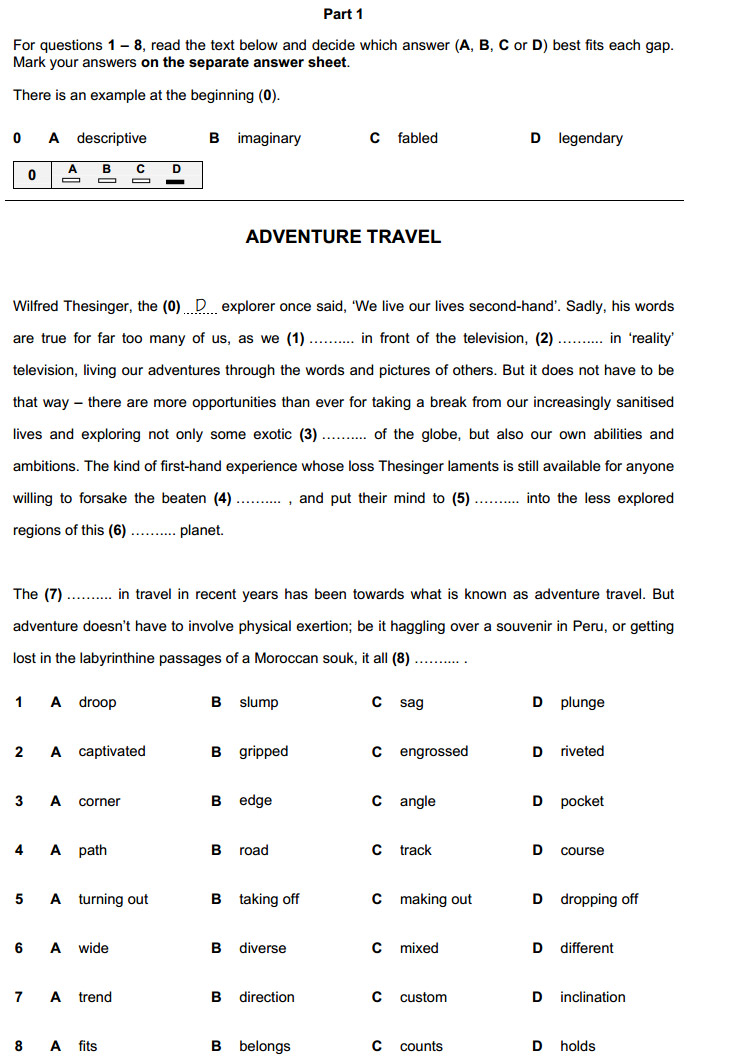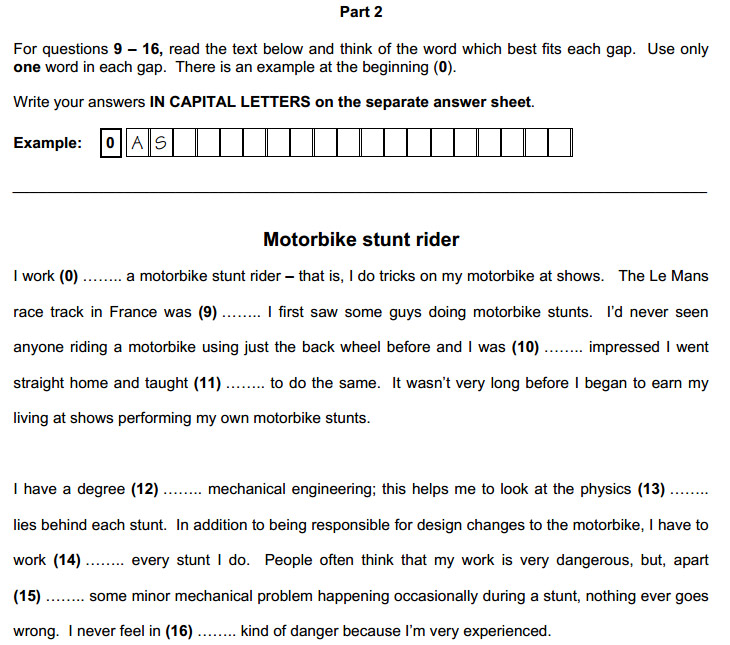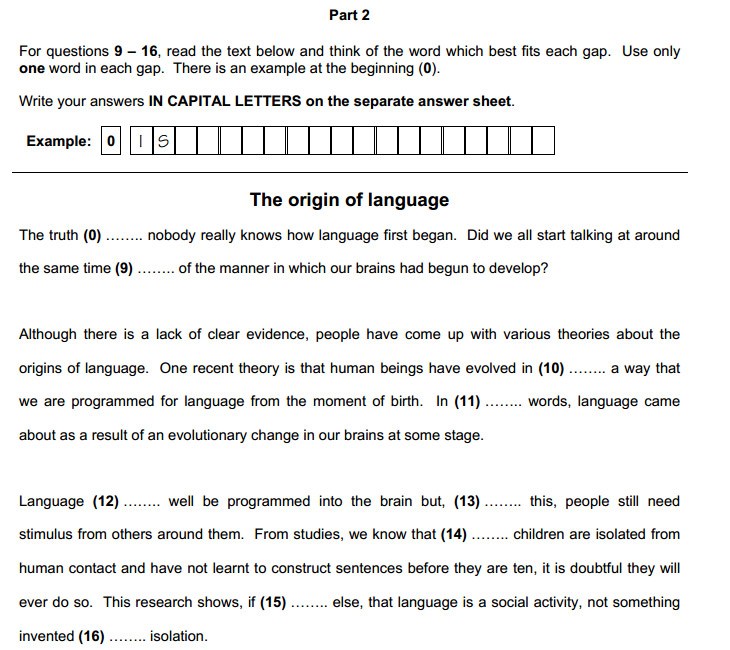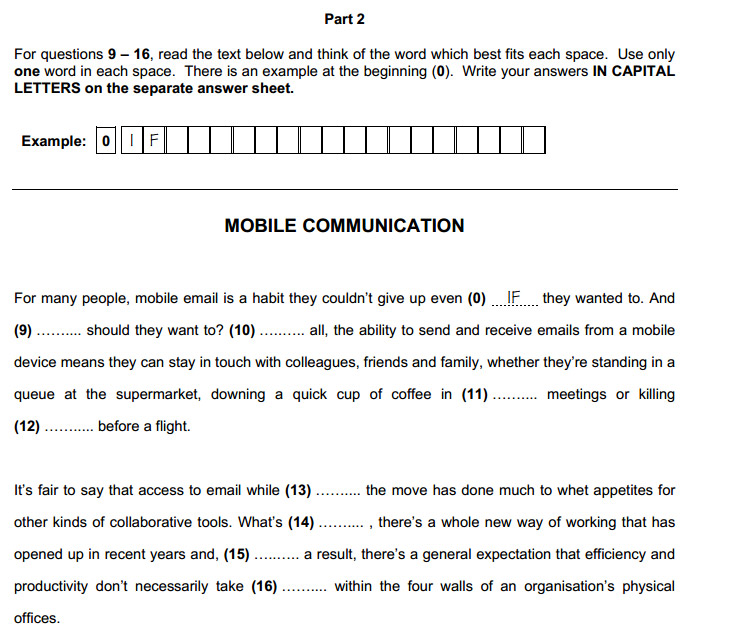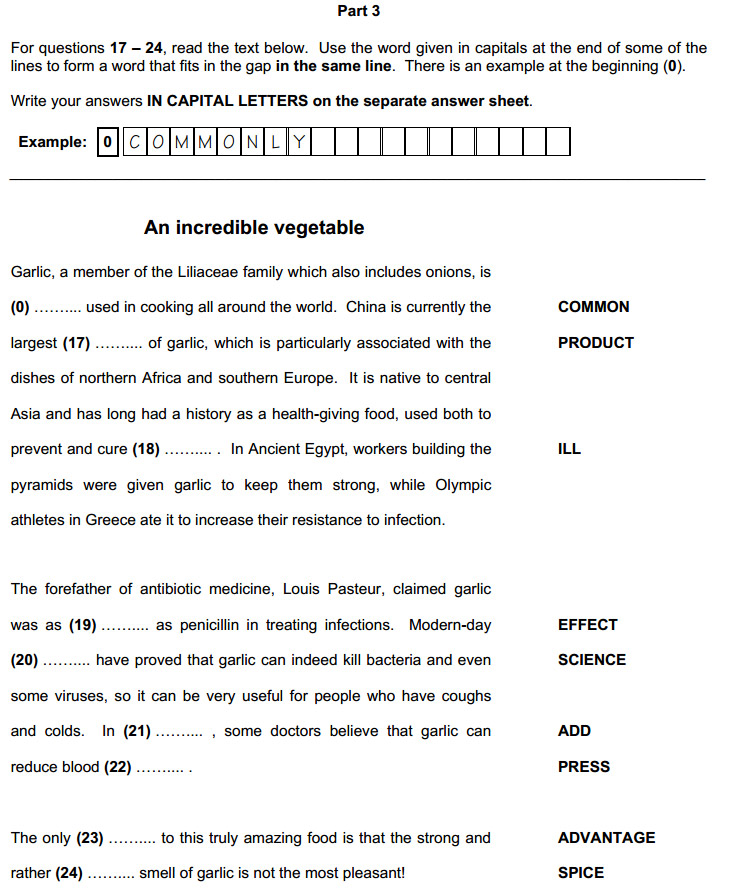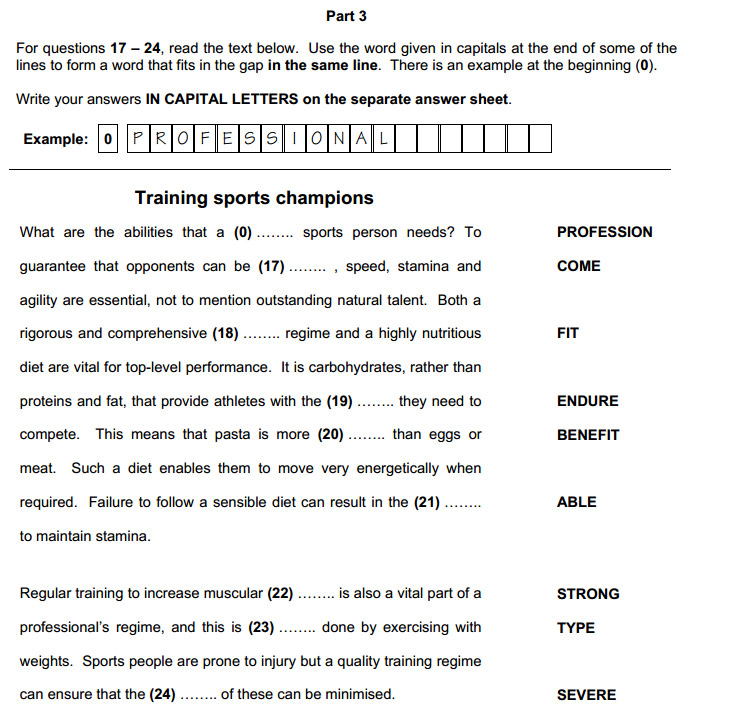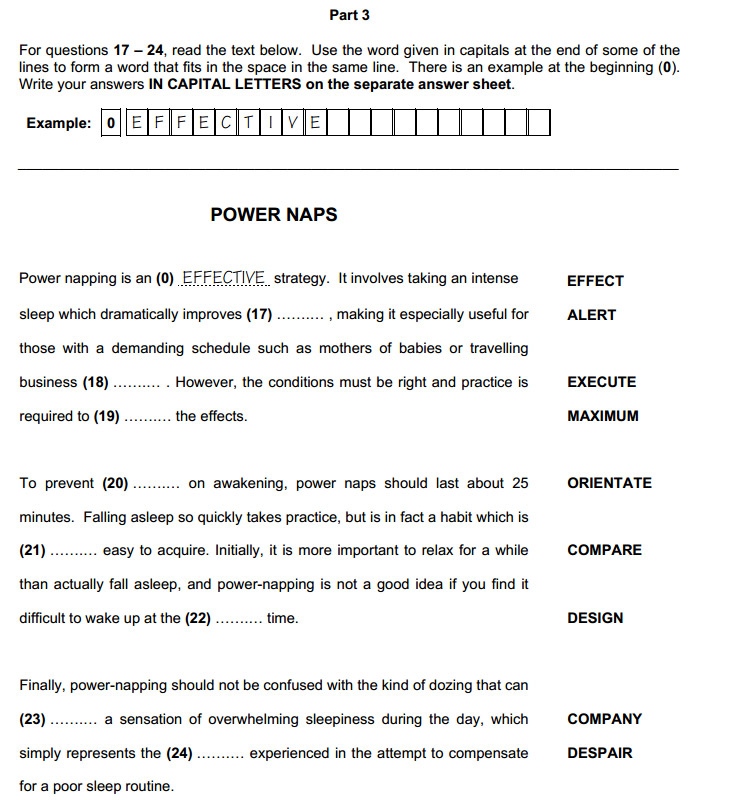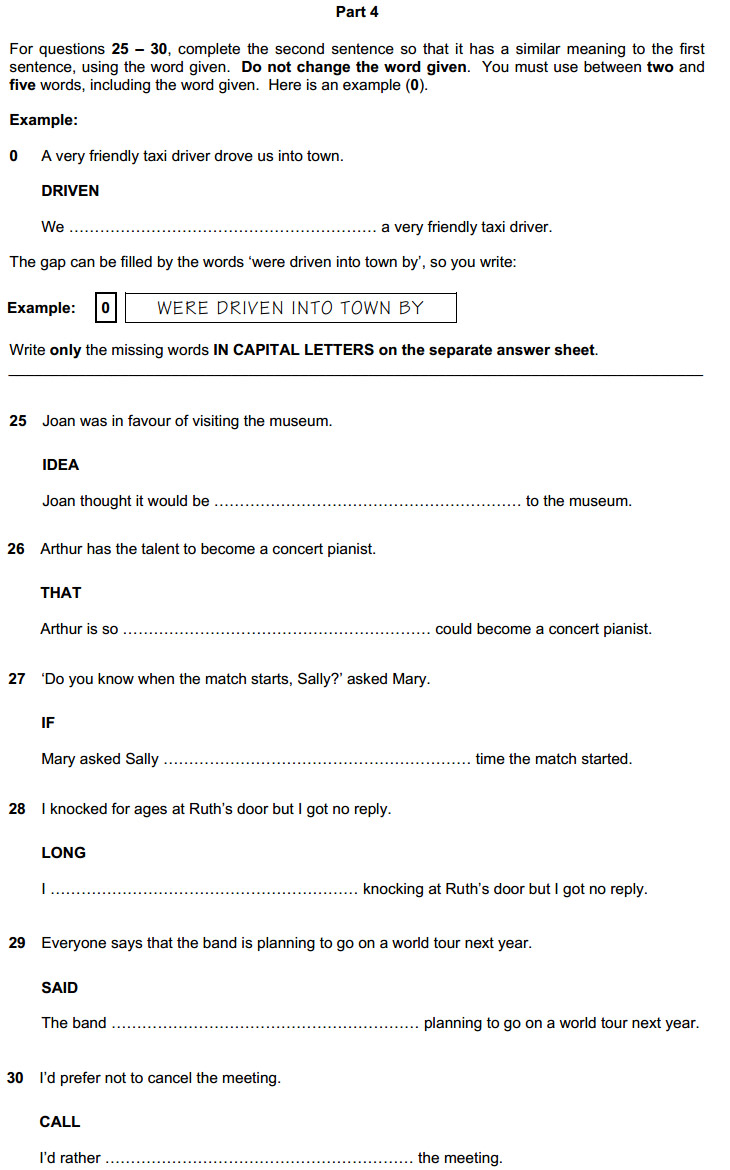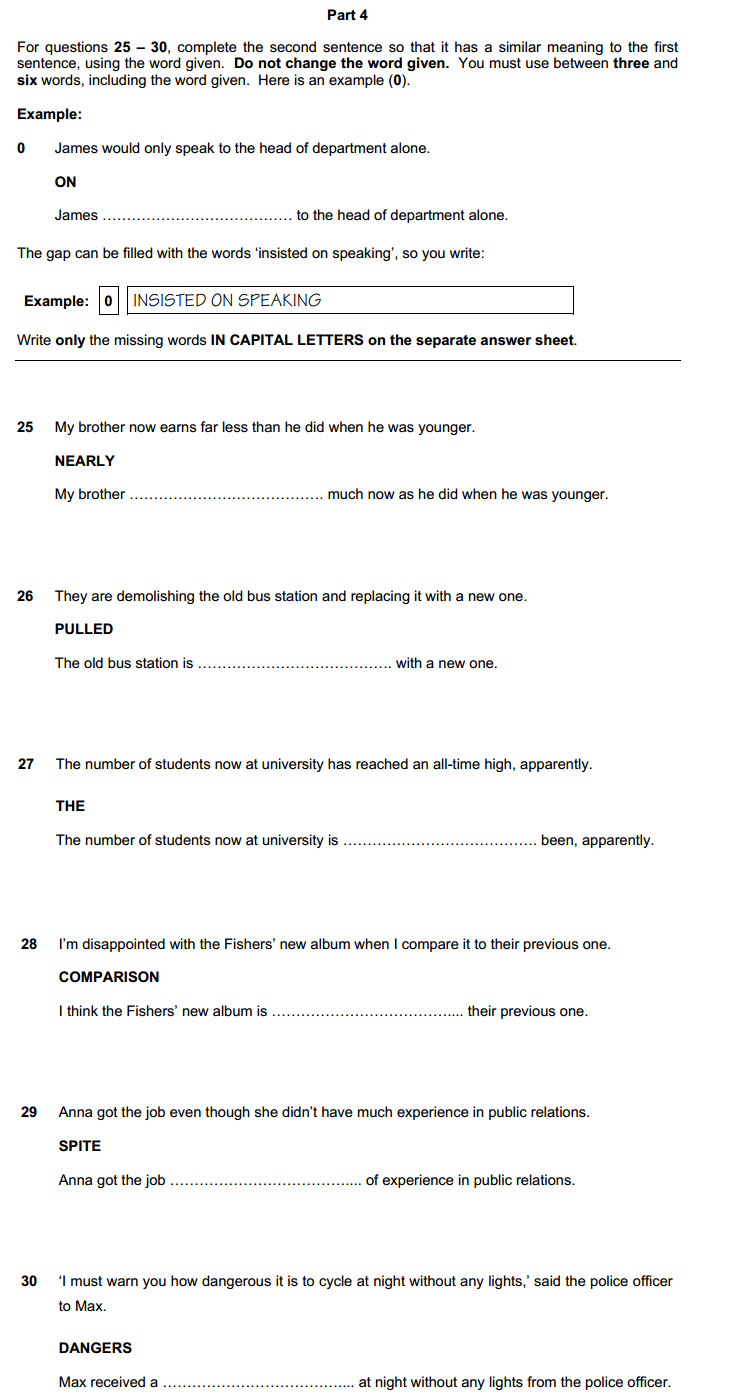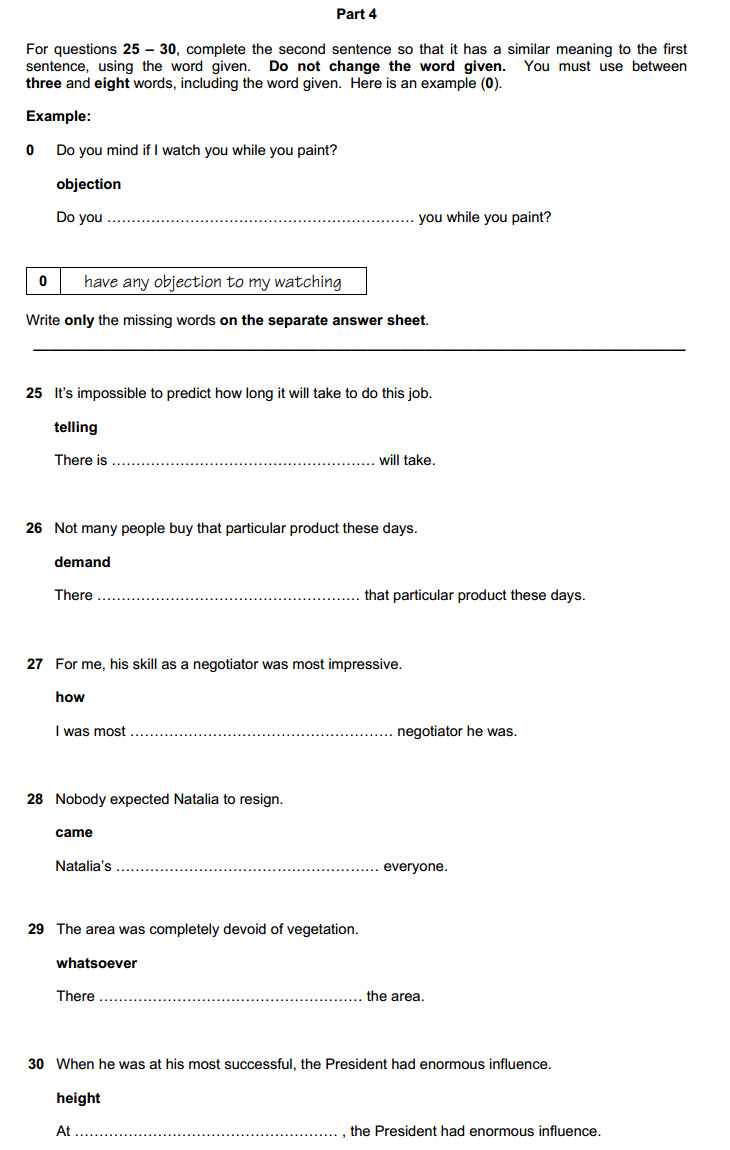-
Task Type: Key Word Transformations
-
Focus: Lexical and grammatical
-
-
Format: Six separate items, each with a lead-in sentence and a gapped second
sentence to be completed in two to five words, one of which is a given
‘key word’
-
-
Number of questions: 6
-
How many marks are there: Up to two marks for each correct answer
What is testing:
- modal verbs and semi-modal verbы
- phrasal verbs
- verb patterns
- direct speach to reported speach
- active voice to passive voice
- linking words/do and make/idioms/conditionals/unreal past
General Advice
- Write between two and five words as your answer
- Contractions like can’t or mustn’t are counted as two words
- Take a guess if necessary! You will not loose marks
- Remember that you cannot change the key word
cambridge english first certificate (fce) test
Key Word Transformations
- FCE : Key Word Transformations 1
- FCE : Key Word Transformations 2
- FCE : Key Word Transformations 3
- FCE : Key Word Transformations 4
- FCE : Key Word Transformations 5
- FCE : Key Word Transformations 6
- FCE : Key Word Transformations 7
- FCE : Key Word Transformations 8
- FCE : Key Word Transformations 9
- FCE : Key Word Transformations 10
- FCE : Key Word Transformations 11
- FCE : Key Word Transformations 12
- FCE : Key Word Transformations 13
- FCE : Key Word Transformations 14
- FCE : Key Word Transformations 15
- FCE : Key Word Transformations 16
- FCE : Key Word Transformations 17
- FCE : Key Word Transformations 18
- FCE : Key Word Transformations 19
- FCE : Key Word Transformations 20
Home > B2 Key Word Transformation 1

About 10 minutesStrengthening vocabulary and grammarCambridge English B2 First Exam
B2 Key Word Transformation 1

You need to be able to understand a range of texts, including how they are organised and the opinions and attitudes expressed in them. The texts will be from sources familiar to you such as magazines, articles, fiction and advertisements, but targeted at the interests of students. Students’ use of English will be tested by tasks which show how well they can control their grammar and vocabulary.
- Use of English Part 1
- Use of English Part 2
- Use of English Part 3
- Use of English Part 4
- Reading Part 5
- Reading Part 6
- Reading Part 7
For this part, you practice vocabulary by using words with similar meanings, collocations, linking phrases, phrasal verbs, etc.
For this part, you practice grammar and vocabulary.
For this part, you practice vocabulary word-building by changing different words using a base word.
For this part, you have to express a message in different ways showing flexibility and resource in the use of language.
For this part, you practice how to understand the details of a text, including opinions and attitudes.
For this part, you practice how to understand the structure and follow the development of a text.
For this part, you practice how to find specific information in a text or texts.
B2 First Writing Section
You are required to produce two pieces of writing. The first piece is compulsory and will be an essay of 140-190 words. For the second, you can choose from an article, email/letter, essay, review or report (B2 First for schools the report is replaced with a story) of 140-190 words.
- Video
- Essay
- Article
- Story
- Review
- Report
B2 First Listening and Speaking Section
Requires being able to follow and understand a range of familiar spoken materials, such as news programmes, public announcements and other sources, but targeted at the interests of the learners.
- Speaking Part 1
- Speaking Part 2
- Speaking Part 3
- Speaking Part 4
- Listening Part 1
- Listening Part 2
- Listening Part 3
- Listening Part 4
In this part you talk to the examiner about yourself and your life, e.g. your name, school, interests and future plans.
In this part, you talk about two photos on your own which you have to compare for about 1 minute. After you have finished, your partner will be asked a short question about your photo. When your partner has spoken about their photos for about 1 minute, you will be asked a question about their photos.
In this part you express ideas with your partner by looking at a discussion point that the examiner gives you.
This will be available soon.
In this part, you focus on general aspects of a topic with the examiner or you may involve your partner.
This will be available soon.
In this part, you will hear people talking in eight different situations.
In this part, you will hear someone being interviewed.
In this part, you will hear five people talking about different things.
In this part, you will hear an interview.
Especially helpful are exercises that are focussed on a theme or topic as these provide word retention practise so you can be confident to read, write, speak and listen successfully. We have many activities to get your English up to speed in no time.
- Customs and Traditions
- Entertainment and Leisure
- Environmental and Nature
- Future Jobs and Education
- Identity and Well-being
- Travel and Adventure
Customs and Traditions explores how we celebrate our cultural identity across the globe.
Entertainment and Leisure explores how we spent our free time.
Environment and Nature explores the way humans and animals live, adapt and change on our planet.
Exploring how different societies create roles for people to develop their skills and knowledge.
Exploring how we learn and adjust to the world around us. .
Exploring how we experience the world through our life journeys
The more words you encounter and understand, the broader your day-to-day vocabulary will become. Our word games and puzzles such as our films word search are an excellent way to help to reinforce spellings in your mind.
- Crossword Puzzles
- Word Searches
- Word Puzzles
Level Links:
This free material is for students at an Upper Intermediate Level of English. This will probably be suitable for students in their third or fourth year of English studies. We add exercises on grammar and vocabulary as well as whole text activities on a regular basis. In addition, we provide test practice activity for students who are preparing for the C1 Advanced which is part of the Cambridge Assessment English Main Suite as well as the English Language B for the IB Diploma. The material will also support students studying for the Cambridge Advanced courses and IELTS examinations.
We also provide free resources across the full range of levels to provide the tools to communicate in English well.
Beginner | Elementary | Intermediate | Upper Intermediate | Advanced
В этой статье мы разберем структуру заданий одной из самых значимых частей кембриджских экзаменов Use of English (использование английского — грамматика и лексика) и поделимся советами по их успешному выполнению.
В блоге уже выходили статьи о том, как сдать Writing (письменную часть), Reading (чтение) и Listening (аудирование) на экзаменах FCE, CAE, CPE — советуем ознакомиться с этими материалами. Теперь перейдем к тому, как подготовиться к части Use of English экзаменов FCE, CAE, СPE.
Типы заданий в части Use of English
Раздел Use of English экзаменов FCE, CAE и CPE объединен с разделом Reading. На выполнение всей части Reading and Use of English вам дадут 1 час 15 минут на экзамене FCE и 1 час 30 минут на CAE и CPE. За это время вам надо выполнить порядка 7-8 заданий. Первые 4 задания относятся к части Use of English, которая проверяет ваш словарный запас и знание грамматики, а остальные — к части Reading.
Давайте посмотрим, из каких заданий состоит Use of English на кембриджских экзаменах:
| Экзамен | Multiple choice cloze | Open cloze | Word formation | Key word transformations |
|---|---|---|---|---|
| FCE, CAE, CPE | Part 1 8 предложений по 1 баллу |
Part 2 8 предложений по 1 баллу |
Part 3 8 предложений по 1 баллу |
Part 4 4-6 предложений по 2 балла |
Экзамены совпадают по структуре, баллам и количеству заданий, но отличаются по степени сложности. Разберем примеры заданий Кембриджских экзаменов с официального сайта: FCE, CAE и CPE.
Part 1: Multiple-choice cloze (выбрать правильный ответ из нескольких предложенных)
Суть задания: Вам нужно заполнить пропуски в тексте, выбрав одно из предложенных четырех слов. Всего пропущено 8 слов. В этом задании проверяется словарный запас (vocabulary) — знание фразовых глаголов, устойчивых выражений, идиом, оттенков значений и т. п.
Техника выполнения: Чтобы получить общее представление о тексте, прочитайте его, не обращая внимания на пропущенные слова. Далее внимательно читайте каждое предложение и варианты ответа. Исключите варианты, которые явно не подходят, затем из оставшихся выберите тот, который логически дополнит предложение и будет сочетаться с рядом стоящими словами. Рассмотрим пример:
They couldn’t (1)… a decision and agreed to meet again after lunch.
a) arrive
b) achieve
c) reach
d) attain
Хорошо зная устойчивые словосочетания, вы выберите вариант reach.
I like to go to the beach (2)… my wife likes to stay in and watch a TV show.
a) then
b) where
c) when
d) whereas
Однозначно не подходят варианты then (в примере указаны не последовательные действия, а параллельные) и where (нелогично, она в номере смотрит шоу, а не на пляже). Выбирая между when и whereas, следует предпочесть «в то время как», в значении противопоставления, а не просто «когда». Правильный ответ — whereas.
Пример задания multiple choice cloze на экзамене FCE
Пример задания multiple choice cloze на экзамене CAE
Пример задания multiple choice cloze на экзамене CPE
Part 2: Open cloze (вставить слово в предложение без вариантов ответа)
Суть задания: Нужно вновь заполнить пропуски в тексте словами, подходящими по смыслу. Пропущено 8 слов, но в этот раз вам не предлагают никаких вариантов.
Техника выполнения: Прочтите текст, не обращая внимания на пропущенные слова. Затем прочитайте внимательно каждое предложение. Обратите внимание, какие слова стоят до и после пропущенного слова. Они подскажут вам, к какой части речи относится это слово, число или время, в котором оно должно стоять. Например:
I really (1)… like this picture! It’s a masterpiece.
Очевидно, что предложение вполне самодостаточное и без вставки. Вместе с тем вы можете увидеть, что перед вами эмоциональное высказывание. Значит, правильно будет вспомнить про вспомогательный глагол do в функции усиления — I really do like this picture! It’s a masterpiece.
The concert has been cancelled (2)… to the epidemic situation in the city.
В первой части предложения — следствие, а во второй — причина. Мы не можем вставить because, так как после него употребляется предлог of, a не to. Необходимо рассмотреть другие варианты, близкие по значению к «потому что» и «из-за». Отлично подойдут owing и due. Иногда могут подходить сразу два варианта ответа, каждый из них будет правильным, но вам все равно нужно вписать один.
Пример задания open cloze на экзамене FCE
Пример задания open cloze на экзамене CAE
Пример задания open cloze на экзамене CPE
Part 3: Word formation (словообразование)
Суть задания: Вам нужно заполнить пропуски в тексте, образуя однокоренные слова от предложенных. Это задание проверяет насколько грамотно вы используете словарный запас.
Техника выполнения: Следует прочитать текст несколько раз — сначала бегло, а затем вдумчиво, обращая внимание на key words и слова, которые идут до и после него. Это поможет вам правильно определить часть речи производного слова. Большинство слов изменяются с помощью приставок, суффиксов и окончаний, например: courage – discourage, circle – circular, health – unhealthy, employ – unemployed. Переведите предложение, чтобы убедиться в правильности выбранной части речи.
Самые распространенные ошибки при выполнении этого задания:
- Путаница в отрицательных и положительных характеристиках
Don’t be so …, I’ll finish the task in a minute. (patience)
Если не обратить внимание на отрицание (don’t be) и использовать прилагательное patient (производное от patience), то это будет ошибкой. Правильный ответ — impatient.
Чтобы избежать ошибки, внимательно читайте весь текст и следите за логикой предложения.
- Неправильная часть речи
My boyfriend is not very … about the idea of going to New York. (enthusiasm)
Правильный ответ — прилагательное enthusiastic. Если использовать вместо него наречие enthusiastically, это будет ошибкой. Выбор наречия вместо прилагательного и наоборот — распространенная ошибка.
- Ошибки в выборе единственного или множественного числа
Tina’s husband is one of the strongest … in her business. (support)
Правильный ответ — supporters. Единственное число — supporter — будет ошибкой. Сбить может тот факт, что мы говорим об одном человеке, но ведь в предложении есть конструкция one of (один из).
- Орфографические ошибки
Чтобы избежать орфографических ошибок, необходимо регулярно практиковать правописание и не лениться проверять слова в словаре.
Пример задания word formation на экзамене FCE
Пример задания word formation на экзамене CAE
Пример задания word formation на экзамене CPE
Part 4: Key word transformations (перефразирование предложения с использованием ключевого слова)
Суть задания: Вам даны предложение и ключевое слово/словосочетание. Необходимо преобразовать предложение таким образом, чтобы в него вошло данное ключевое слово/словосочетание, учитывая ограничения по количеству слов, указанных в задании. Полученное предложение не должно отличаться по смыслу от исходного.
Техника выполнения: Прочитайте исходное предложение и вспомните все устойчивые выражения и фразы с указанным key word. Затем прочитайте второе предложение с пропуском. При трансформации предложения вы не должны выходить за рамки указанного количества слов в задании (с учетом key word). Конечно, нельзя изменять key word. Например, если дано wish, не стоит использовать wishes или wishing. Если дано not, нельзя вместо него использовать no. Также проверяйте, нет ли в вашем ответе лишних слов. Разберем пример:
I regret ever telling her about my private life. (wish)
I ____________________ her about my private life.
Правильный ответ — I wish I had not told her about my private life.
В приведенном примере местоимение her уже есть в предложении с пропуском. Если напишете wish I had not told her вместо wish I had not told, это будет ошибкой. За каждое верно перефразированное предложение вы получаете два балла, и один балл, если вы допустили небольшую ошибку.
Пример задания key word transformations на экзамене FCE
Пример задания key word transformations на экзамене CAE
Пример задания key word transformations на экзамене CPE
Хотите получить международный сертификат? Записывайтесь на курс подготовки к экзаменам.
Как успешно сдать Use of English — 7 советов
- При подготовке много читайте. Желательно, чтобы тексты были различной тематики. Отдавайте предпочтение газетным и научным статьям. Выбирайте серьезные издания, например, The Washington Post или The Guardian. Читая тексты, выписывайте и учите новую для вас лексику, также изучайте и повторяйте готовые подборки устойчивых выражений и идиом. Например, их можно найти в учебной серии Oxford Word Skills Intermediate и Advanced.
- Относитесь к грамматике как к инструменту, который на экзамене поможет вам точно выразить свои мысли. Разбирайте грамматические правила и отрабатывайте их.
- Выполняйте пробные тесты и тренируйтесь распределять время на каждый тип заданий. Обратите внимание, что необходимо брать тестовые задания, изданные не ранее 2015 года, потому что в этом году произошли изменения в формате кембриджских экзаменов.
- Не зацикливайтесь на одном задании. Если вы сомневаетесь, напишите возможные варианты ответа на полях и продолжайте выполнять тест. К пунктам, в которых вы не уверены, вернитесь позже.
- Проверяйте свои ответы каждый раз, как выполнили задание.
- Пользуйтесь подходящими ресурсами:
- Cambridge English Exam Booster — пособие содержит 48 экзаменационных заданий. В книге рассмотрены типичные ошибки и даны рекомендации для успешной сдачи экзамена.
- Cambridge English First 2, Cambridge English Advanced 2 и Cambridge English Proficiency 2 — каждая книга содержит 4 теста для каждого из экзаменов. Пособия ознакомят вас с содержанием и форматом экзаменов FCE, CAE и CPE.
- Cambridge English Teacher Rory — советы по подготовке к FCE и CAE от преподавателя и носителя языка Рори.
- Floe-Joe — тренировочные упражнения в формате экзаменов FCE, CAE, CPE.
- Рекомендуем найти преподавателя, который сам получил международный сертификат и у которого есть опыт подготовки студентов к экзамену. Такой учитель не только проработает с вами типовые задания, но и расскажет о методике сдачи экзамена исходя из своего опыта. Он поможет вам правильно организовать подготовку, структурировать информацию, поделится психологическими приемами. Если вы в поиске такого учителя, обратитесь в нашу школу, и менеджеры подберут преподавателя, который поможет вам сдать экзамен на высокий балл.
Желаем успехов в сдаче экзаменов!
© 2023 englex.ru, копирование материалов возможно только при указании прямой активной ссылки на первоисточник.
by Adam Skimins 7th March 2022
- Article navigation:
- (FCE) 40 Key Word Transformation: Exercises
- B2 First (FCE) Use of English Part 4: Tips & Strategy
The important thing in key word transformations is that you keep the meaning the same – EXACTLY the same. So it’s important that you read through the first sentence and your second sentence to ensure you have kept the meaning the same. Look at these two sentences:
Tommy said he was ready for his driving test and would take it in July.
Tommy said he was ready for his driving test and could take it in July.
One letter has been changed, from “would” to “could” but it changes the meaning of the sentence totally. Be careful of this!
A good way to practise this part of the FCE exam is to get used to writing and re-writing sentences using different structures and without changing the meaning.
(FCE) 40 Key Word Transformation: Exercises
Complete the sentence so that it has a similar meaning. Do not change the word given. You must use between two and five words, including the word given.
Nobody took any notice of his bad behaviour.
Nobodypaid ATTENTION to (ATTENTION) his bad behaviour.
You should try and take advantage of his help.
You should try and (MOST) help he gives you.
make the most of themake the most of any
You must include the word given (MOST)You must use beetwen 2 and 5 words.
My sister was involved in her school spelling competition.
My sister (PART) spelling competition.
took part in her schoolwas part of her school
You must include the word given (PART)You must use beetwen 2 and 5 words.
Could they grow anything here after the war?
Were (ABLE) here after the war?
they able to grow anything
You must include the word given (ABLE)You must use beetwen 2 and 5 words.
‘Why didn’t you call me?’ asked Joe.
Joe (ASKED) not called him.
asked me why i hadasked why i had
You must include the word given (ASKED)You must use beetwen 2 and 5 words.
Driving that fast was a stupid thing to do.
If (ONLY) driving so fast.
only i hadn’t beenonly i had not been
You must include the word given (ONLY)You must use beetwen 2 and 5 words.
I hadn’t seen my sister for about a year, when I saw her last.
About (GONE) before I saw my sister again, after the last time I saw her.
a year had gone by
You must include the word given (GONE)You must use beetwen 2 and 5 words.
Complete the sentence so that it has a similar meaning. Do not change the word given. You must use between two and five words, including the word given.
Nobody took any notice of his bad behaviour.
Nobodypaid ATTENTION to (ATTENTION) his bad behaviour.
I don’t earn anything like the amount I did before.
I earn (NOWHERE) as I did before.
nowhere near as much
You must include the word given (nowhere)You must use beetwen 2 and 5 words.
The date for the Barcelona Conference is the 23rd of March.
The Barcelona Conference (PLACE) the 23rd of March.
takes placewill take placeis taking place on
You must include the word given (place)You must use beetwen 2 and 5 words.
The house was not very attractive in appearance when we first saw it.
The house was (MUCH) at when we first saw it.
not much to look
You must include the word given (much)You must use beetwen 2 and 5 words.
No-one wants to buy this type of music any more.
There (LONGER) for this type of music.
is no longer any demand
You must include the word given (longer)You must use beetwen 2 and 5 words.
Looking back, I think I was right to study mathematics at university.
Looking back, I (REGRET) mathematics at university.
do not regret studyingdon’t regret studying
You must include the word given (regret)You must use beetwen 2 and 5 words.
Our spending will have to be reduced next year.
We will have (BACK) our spending next year.
to cut back on
You must include the word given (back)You must use beetwen 2 and 5 words.
Complete the sentence so that it has a similar meaning. Do not change the word given. You must use between two and five words, including the word given.
Nobody took any notice of his bad behaviour.
Nobodypaid ATTENTION to (ATTENTION) his bad behaviour.
While we were going home yesterday we got caught in a thunderstorm.
We got caught in a thunderstorm while we were (WAY) yesterday.
on our way home
You must include the word given (way)You must use beetwen 2 and 5 words.
Has Mary altered her decision about moving to the countryside?
Do you know if Mary (MIND) about moving to the countryside?
has changed her mind
You must include the word given (mind)You must use beetwen 2 and 5 words.
I’d like Kevin to stop telling me what to do.
I (WISH) telling me what to do!
wish kevin would stopwish that kevin would stop
You must include the word given (wish)You must use beetwen 2 and 5 words.
‘Are you pleased it’s nearly half-term?’ said the teacher to us.
The teacher wanted (KNOW) pleased it was nearly half-term.
to know if we were
You must include the word given (know)You must use beetwen 2 and 5 words.
We are earning less than we are spending, I’m afraid.
Our (EXPENDITURE) our income, I’m afraid.
expenditure is more thanexpenditure is greater than
You must include the word given (expenditure)You must use beetwen 2 and 5 words.
I don’t think having luxuries in life is necessary.
I don’t (NECESSITY) having luxuries in life.
see the necessity ofsee the necessity insee any necessity ofsee any necessity in
You must include the word given (necessity)You must use beetwen 2 and 5 words.
Complete the sentence so that it has a similar meaning. Do not change the word given. You must use between two and five words, including the word given.
Nobody took any notice of his bad behaviour.
Nobodypaid ATTENTION to (ATTENTION) his bad behaviour.
I am starting to find watching television boring.
I am beginning to get (FED) television.
fed up with watching
You must include the word given (fed)You must use beetwen 2 and 5 words.
Bad weather makes me feel really unhappy in the winter.
Bad weather (DOWN) in the winter.
really gets me down
You must include the word given (down)You must use beetwen 2 and 5 words.
Fog delayed my flight to Moscow this morning.
My flight to Moscow (UP) this morning
was held up by fog
You must include the word given (up)You must use beetwen 2 and 5 words.
Help was urgently needed in the flooded area of the country.
They were (NEED) in the flooded area of the country.
in urgent need of help
You must include the word given (need)You must use beetwen 2 and 5 words.
I went to Italy with the intention of learning Italian.
I went to Italy (THAT) Italian.
so that i could learn
You must include the word given (that)You must use beetwen 2 and 5 words.
Remember to return the videos you have rented.
Don’t (BACK) the videos you have rented.
forget to take backforget to bring back
You must include the word given (back)You must use beetwen 2 and 5 words.
Complete the sentence so that it has a similar meaning. Do not change the word given. You must use between two and five words, including the word given.
Nobody took any notice of his bad behaviour.
Nobodypaid ATTENTION to (ATTENTION) his bad behaviour.
To tell the truth, we need a swimming pool for this school.
To tell the truth, (WHAT) a swimming pool for this school.
what we need is
You must include the word given (what)You must use beetwen 2 and 5 words.
Do you know whose this umbrella is, by any chance?
Do you know (BELONGS), by any chance?
who this umbrella belongs to
You must include the word given (belongs)You must use beetwen 2 and 5 words.
Was it Paul’s idea to go to the cinema?
Was it Paul (CAME) the idea of going to the cinema?
who came up withthat came up with
You must include the word given (came)You must use beetwen 2 and 5 words.
The boats began to move slowly out of the harbour.
The boats slowly (WAY) out of the harbour.
made their way
You must include the word given (way)You must use beetwen 2 and 5 words.
One runner did not succeed in finishing the race.
One runner (ABLE) the race.
wasn’t able to finishwas not able to finish
You must include the word given (able)You must use beetwen 2 and 5 words.
It is not my fault that the glass broke.
You cannot (BLAME) the glass.
blame me for breaking
You must include the word given (blame)You must use beetwen 2 and 5 words.
Would you pass B2 First (FCE)?
Sign up, resolve the tests and see what results you get.
Sign up
B2 First (FCE) Use of English Part 4: Tips & Strategy
B2 First (FCE) Use of English: Part 4 question type here is called key word transformation.
You must complete a new sentence that has a similar meaning. You use a word in capitals given in bold for each sentence, which you must not change.
Strategy
- Read the sentence carefully and think about its exact meaning.
- Check your tenses – if the first sentence is in the past tense, the second should be, too!
- Contractions (e.g. haven’t) count as two words.
- Try to keep the same meaning – If the first sentence says ‘Tom said…’ then don’t write ‘He said…’ in the second sentence. (Write ‘Tom said’.)
- Write between two and five words, including the word given.
Tips
Find things that are the same in both sentences and delete them. That helps you to focus on what you actually need to be transforming.
Because of the scoring system, it’s possible to get 50% in this section without getting any of the questions 100% correct. So it’s worth answering every question! Even incomplete answers can get points
Make absolutely sure that the two sentences mean the same thing. For example, if the sentence to transform has names in it, the answer will have to have them too.
Would you pass B2 First (FCE)?
Sign up, resolve the tests and see what results you get.
Sign up

